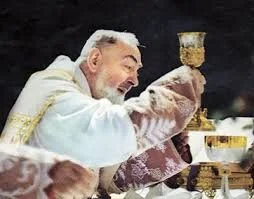The Mass sits on a foundation. The bloodless sacrifice sits on the bloody sacrifice (C.C.C. 1366 & 1367). Without the bloody sacrifice - without its foundation- , the Mass is meaningless. Yet, our clerics tend to divorce the Mass from its foundation. They over-emphasize the Mass and under-emphasize its foundation.
Our clergy tend to focus on the real presence of Jesus in the most Holy Eucharist. Indeed, the real presence is true. However, it is not true enough. It is a gross oversimplification of the most Holy Eucharist. The most Holy Eucharist has a richer more complex meaning than the real presence of Jesus in it. The more important truth of the Mass is the significant detail about God that Jesus disclosed to us on the road from the Crucifixion to the Resurrection and the dramatic demonstration of divinity by which he disclosed it.
Jesus did not deposit his real presence into the most Holy Eucharist. The real presence is a generality - an abstraction from the deposit that actually took place. Jesus deposited his body and blood into the bread and wine of the most Holy Eucharist. Why the specificity? Why wasn’t a deposit of the real presence true enough? Jesus’s decision to use body, blood, bread and wine in the most Holy Eucharist was not random, accidental, arbitrary or capricious. Jesus deliberately picked the four elements of the most Holy Eucharist. The body and blood point our attention to his bloody wounds and their meaning (1 Corinthians 1:17). The bread and wine convey their importance. Without food and drink, we die of hunger and thirst. Without the bread and wine of the most Holy Eucharist, death is just as certain.
On the road from the Crucifixion to the Resurrection, Jesus and the evil that we did to him met in a violent collision. A bombshell of revelation exploded out of the collision. The incandescence of the explosion illuminated the darkness of our understanding of God in a glorious burst of epiphany. We tortured and killed him. He suffered and died. Yet, our God forgave us for the evil that we did to him. Wow! The brutality of the Crucifixion makes the intransigence of his love for us extraordinarily amazing. The intransigence of God’s love for us despite the brutality of the Crucifixion is the significant detail about God that Jesus disclosed on the road from the Crucifixion to the Resurrection in a dramatic demonstration of divinity. Our God is the God who forgave us for the evil that we did to him.
The intransigence of God’s love for us despite the brutality of the Crucifixion is the good news of great joy. However, it does not propagate itself. God gave us the Mass to serve as the vehicle that propagates the good news of great joy from then and there across space and time to us here and now. Propagation of the good news of great joy is the purpose of the Mass. God did not invent the Mass to propagate his real presence. His real presence is incidental to the good news of great joy - necessary but not sufficient. God established the institution of the Mass to remind us through his bloody wounds that our God is the God who forgave us for the evil that we did to him. To know forgiveness is to know God. Wow! What a God is our God!









